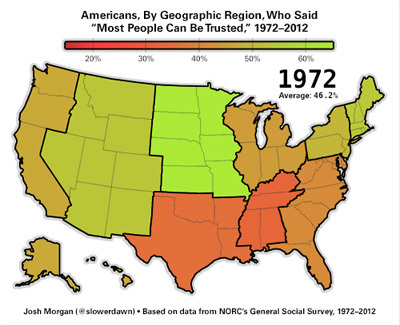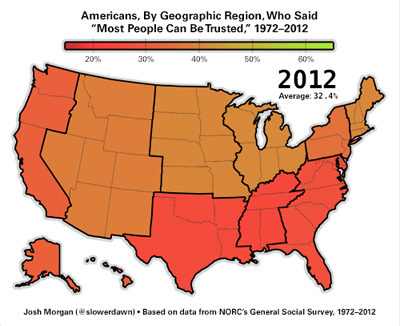annabenedetti
like marbles on glass
Red America vs. Blue America
"An irrepressible conflict between opposing and enduring forces" — that's how U.S. Sen. William Seward of New York described the rising strife and mounting enmity between the North and South in 1858, three years before the start of the Civil War.
It's also a pretty fair description of the relationship between California and the Trump administration today. In the growing war between blue and red America, this is the battlefield that is and will remain the most active front.
No mystery attends California's status as the GOP's nightmare-***-punching-bag. It is among the most Democratic states in the union; it is second only to Hawaii in the percentage of voters casting ballots for Hillary Clinton in 2016. It is also — again, just behind Hawaii — among the most multiracial of states. Non-Hispanic whites, at just 38% of the population, no longer even constitute a plurality in California. The state's white working class, the core of Trump's base, is, in percentage terms, among the smallest in the nation.
Quite unlike Hawaii, however, California is by far the nation's most populous state. That has allowed it to become a rival power center to Trump's Washington, and it just keeps enacting policies on immigrants, the environment, taxing and spending from which other Democratic states take their lead. It's also opposing the president's diktats in court. As of last week, the New York Times counted 29 lawsuits filed by California Attorney General Xavier Becerra against the federal government, challenging Trump's attempts to restrict voting rights, bar refugees from Muslim countries, build a wall on the Mexican border, remove legal protections for "Dreamers," diminish the tally of immigrants in the Census, penalize sanctuary cities …
The list goes on and on. And it shows that, as in 1858, the California-Trump conflict is rooted in irreconcilable perspectives on the status of certain human beings. Trump has led the Republicans to openly embrace white identity politics (or, less euphemistically, white racism) toward which the GOP has been drifting for decades anyway. This was bound to repel a state as racially diverse as California and a party as racially diverse as the Democrats. (A Pew poll from last month showed that just 59% of Democrats were white, as against 83% of Republicans.) In Trump's Washington, but also in Republican-controlled statehouses around the nation, the governing GOP coalitions feed (and feed on) their rank-and-file's belief that whites are embattled, evangelical Christians particularly so. The way to preserve their values and livelihoods is by suppressing the interests and votes of minority groups.
Limiting minority votes requires shutting off immigration, which in turn requires some fallacious justifications. In the world according to Trump and his supporters — who disproportionately live far from any concentrations of immigrants — those immigrants cause crime. California, a real world with millions of immigrants (documented and not), knows otherwise. It saw the rates of crime undeniably plummet as the number of its immigrants soared.
Racism and xenophobia, then, lie at the heart of this irrepressible conflict, but it has other sources as well. As Ronald Brownstein has noted, "Trump won 13 of the 16 states that produce the most natural gas, 11 of the 15 that produce the most coal, 16 of the 20 that produce the most oil." California, where people moved for the weather only to find smog, has not only led the nation in formulating the strictest air-pollution and auto-emission standards, but has an economy increasingly centered on largely nonpolluting (albeit worryingly monopolistic) high-tech companies. The Trump Administration's first shots in this skirmish were to abandon rules against leaky oil and gas wells. Then it expanded offshore oil drilling. This month the Environmental Protection Agency announced it would roll back the state's auto emission standards, which the Obama administration had adopted nationally.
The auto industry isn't looking forward to years of litigation during which it may have to build parallel fleets of cars — one that meets the emission standards set by California and the 12 other states that adhere to them, and another that adheres to the laxer standards of the Trump administration. That explains why carmakers may yet help broker a deal between Sacramento and Washington.
But on the other California-Trump lawsuits, no third party has enough power to force a compromise anytime soon. And the gap between those who are comfortable in a more egalitarian multi-racial nation and those who insist on preserving the nation's historic white hegemony — chiefly Fox-fed whites in economically abandoned regions — isn't going to close.
Watching the North grow more populous in the years before the Civil War, the South tried furiously to retain its hold on federal power by expanding the number of slave states. Watching today's America grow more racially diverse, more secular, more feminist — in a word, more Californian — Republicans are trying their own version of that move. They are trying furiously to retain power by rigging the census, suppressing voting, preserving gerrymandered districts, and halting immigration. They have a sufficient electoral base in enough states to keep this fight going for a long time. The weight of demographics — assuming we stay a democracy — will eventually defeat them. But until then, the conflict will remain irrepressible.
"An irrepressible conflict between opposing and enduring forces" — that's how U.S. Sen. William Seward of New York described the rising strife and mounting enmity between the North and South in 1858, three years before the start of the Civil War.
It's also a pretty fair description of the relationship between California and the Trump administration today. In the growing war between blue and red America, this is the battlefield that is and will remain the most active front.
No mystery attends California's status as the GOP's nightmare-***-punching-bag. It is among the most Democratic states in the union; it is second only to Hawaii in the percentage of voters casting ballots for Hillary Clinton in 2016. It is also — again, just behind Hawaii — among the most multiracial of states. Non-Hispanic whites, at just 38% of the population, no longer even constitute a plurality in California. The state's white working class, the core of Trump's base, is, in percentage terms, among the smallest in the nation.
Quite unlike Hawaii, however, California is by far the nation's most populous state. That has allowed it to become a rival power center to Trump's Washington, and it just keeps enacting policies on immigrants, the environment, taxing and spending from which other Democratic states take their lead. It's also opposing the president's diktats in court. As of last week, the New York Times counted 29 lawsuits filed by California Attorney General Xavier Becerra against the federal government, challenging Trump's attempts to restrict voting rights, bar refugees from Muslim countries, build a wall on the Mexican border, remove legal protections for "Dreamers," diminish the tally of immigrants in the Census, penalize sanctuary cities …
The list goes on and on. And it shows that, as in 1858, the California-Trump conflict is rooted in irreconcilable perspectives on the status of certain human beings. Trump has led the Republicans to openly embrace white identity politics (or, less euphemistically, white racism) toward which the GOP has been drifting for decades anyway. This was bound to repel a state as racially diverse as California and a party as racially diverse as the Democrats. (A Pew poll from last month showed that just 59% of Democrats were white, as against 83% of Republicans.) In Trump's Washington, but also in Republican-controlled statehouses around the nation, the governing GOP coalitions feed (and feed on) their rank-and-file's belief that whites are embattled, evangelical Christians particularly so. The way to preserve their values and livelihoods is by suppressing the interests and votes of minority groups.
Limiting minority votes requires shutting off immigration, which in turn requires some fallacious justifications. In the world according to Trump and his supporters — who disproportionately live far from any concentrations of immigrants — those immigrants cause crime. California, a real world with millions of immigrants (documented and not), knows otherwise. It saw the rates of crime undeniably plummet as the number of its immigrants soared.
Racism and xenophobia, then, lie at the heart of this irrepressible conflict, but it has other sources as well. As Ronald Brownstein has noted, "Trump won 13 of the 16 states that produce the most natural gas, 11 of the 15 that produce the most coal, 16 of the 20 that produce the most oil." California, where people moved for the weather only to find smog, has not only led the nation in formulating the strictest air-pollution and auto-emission standards, but has an economy increasingly centered on largely nonpolluting (albeit worryingly monopolistic) high-tech companies. The Trump Administration's first shots in this skirmish were to abandon rules against leaky oil and gas wells. Then it expanded offshore oil drilling. This month the Environmental Protection Agency announced it would roll back the state's auto emission standards, which the Obama administration had adopted nationally.
The auto industry isn't looking forward to years of litigation during which it may have to build parallel fleets of cars — one that meets the emission standards set by California and the 12 other states that adhere to them, and another that adheres to the laxer standards of the Trump administration. That explains why carmakers may yet help broker a deal between Sacramento and Washington.
But on the other California-Trump lawsuits, no third party has enough power to force a compromise anytime soon. And the gap between those who are comfortable in a more egalitarian multi-racial nation and those who insist on preserving the nation's historic white hegemony — chiefly Fox-fed whites in economically abandoned regions — isn't going to close.
Watching the North grow more populous in the years before the Civil War, the South tried furiously to retain its hold on federal power by expanding the number of slave states. Watching today's America grow more racially diverse, more secular, more feminist — in a word, more Californian — Republicans are trying their own version of that move. They are trying furiously to retain power by rigging the census, suppressing voting, preserving gerrymandered districts, and halting immigration. They have a sufficient electoral base in enough states to keep this fight going for a long time. The weight of demographics — assuming we stay a democracy — will eventually defeat them. But until then, the conflict will remain irrepressible.




